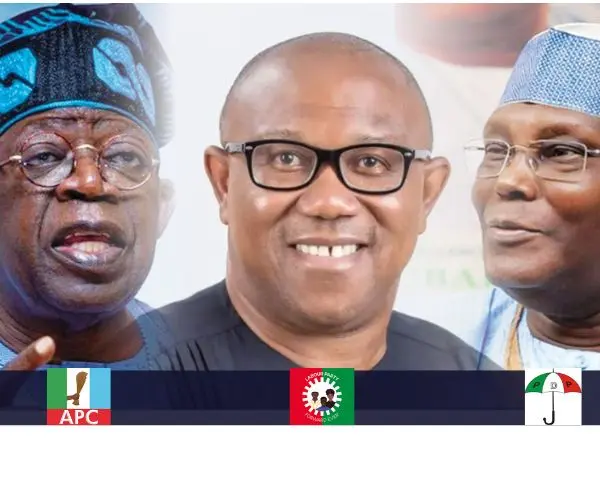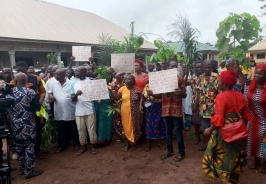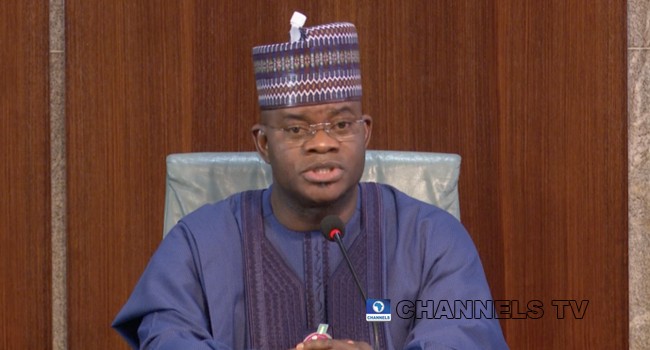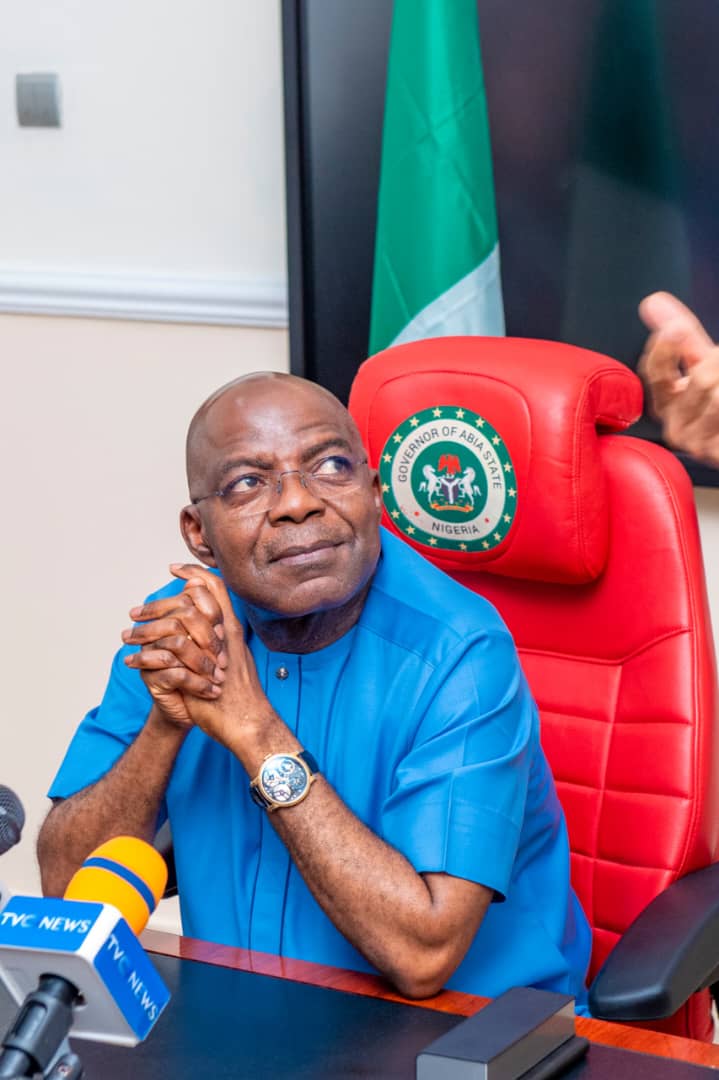As Atiku, Obi, Tinubu Await Sept 16 Deadline, Tribunal Is To Resolve Jigsaw Puzzle In 3 Weeks

As the entire world awaits the outcomes of the three critical petitions instituted by the Peoples Democratic Party (PDP), the Labour Party (LP) and the Allied Peoples Movement (APM) together with their presidential candidates, Alhaji Atiku Abubakar, Mr. Peter Obi and the Delta-born Princess Chichi Ojei respectively, against the declaration by the Independent National Electoral Commission (INEC) of Asiwaju Bola Ahmed Tinubu as the winner of the February 25, 2023 presidential election in the country, Sunday Vanguard, in this report, reviews the separate cases of the petitioners before the Justice Haruna Simon Tsamani-led Presidential Election Petition Tribunal in Abuja and the separate defenses by Tinubu, his political party — All Progressives Congress (APC) – and INEC to each of the petitions.
The tribunal, by constitutional provision, has up till September 16, 2023, about three weeks from now, to deliver its judgment in the cases. As the clock ticks, the high-profile cases have not stopped captivating public attention with all manners of allegations of malpractices flying from all sides against all parties, thereby fueling series of misinformation cum disinformation in both the social and conventional media against virtually all the contenders including the judiciary which has the final say over the cases.
Background
At about 4.00am on March 1, 2023, the Independent National Electoral Commission (INEC) declared Senator Bola Ahmed Tinubu as the winner of the February 25, 2023 presidential poll on the grounds that his party—the All Progressives Congress (APC)—scored the highest votes cast at the poll and that he secured not less than one quarter of the votes cast in each of at least two-thirds of all the states in the Federation and the Federal Capital Territory (FCT) as required by law.
In the results announced on March 1, 2023, Tinubu polled 8,794,726 votes representing 36.61% of the total votes cast at the election to emerge victorious. Atiku who came second scored 6,984,520 representing 29.07% of the votes cast, while Obi scored 6,101,533 representing 25.40% of the votes cast during the disputed election. Rabiu Kwankwaso of the NNPP came fourth with 1,496,687 representing 6.40% of the votes cast. Princess Chichi Ojei, the only female presidential candidate in the election was not near the first four as she pooled a lean 25,961 votes.
Deadline
But within 21 days of INEC announcing the results, five political parties with their presidential candidates approached the registry of the Presidential Election Petition Court to challenge the election outcome.
Under the electoral law, political parties and their candidates have within 21 days of INEC announcing the results to file their petition at the registry of the Appeal Court.
The aggrieved parties who met the deadline included the Peoples Democratic Party (PDP) with its presidential candidate, Atiku Abubakar and the Labour Party, with its candidate, Peter Obi.
The rest were the Action Alliance (AA) with its presidential candidate, Solomon Okangbuan, the Allied Peoples Movement (APM) with its presidential candidate, Chichi Ojei and the Action Alliance with its presidential candidate, Major Hamza Al-Mustapha.
The President of the Court of Appeal, Justice Monica Dongban-Mensem, who is from Plateau State (North Central), exercised her constitutional powers to set up a five-member panel of the court to hear all the petitions challenging Tinubu’s victory in the presidential election while the tribunal was inaugurated by the Chief Justice of Nigeria, Justice Olukayode Ariwoola on November 7, 2022.
The tribunal members are Justice Haruna Tsammani (Chairman) from Gombe North East Nigeria, Justice Stephen Jonah Adah from Kogi, North Central, Justice Misitura Bolaji-Yusuf from Oyo, South West, Justice Boloukuoromo Ugoh from Bayelsa, South South, and Justice Abba Mohammed from Kano, North-West.
On May 8, 2023, the five-member Presidential Election Petition Tribunal began sitting at the Court of Appeal complex in Abuja.
However, in less than one week after the panel began its proceedings, two of the aggrieved political parties withdrew their petitions at the tribunal.
The affected political parties were the Action Alliance (AA) which fielded Solomon Okangbuan as its presidential candidate and the Action Alliance which fielded Major Hamza Al-Mustapha as its presidential candidate for the poll.
But the remaining three others vowed to proceed with their separate cases against Tinubu.
Volatile blend
Sunday Vanguard reports that the ensuing court sessions have been a volatile blend of impassioned debates, emotional displays and desperate attempts from the rival parties to sway the outcome in their favour.
But in summary, all the petitioners prayed the tribunal to declare that Tinubu was not duly elected by a majority of the lawful votes cast at the election.
They also wanted an order mandating the INEC to retrieve the certificate of return issued to the APC candidate and issue a fresh one to them while Tinubu, the APC and the INEC prayed the court not to disturb the election results as announced.
What is the case of Ojei against Tinubu
Ojei together with her political platform—APM, is praying the tribunal to nullify the election of Tinubu on the ground that the APC did not properly sponsor him (Tinubu) for fielding Mr Kashim Shettima as his vice presidential candidate without withdrawing his earlier nomination as a senatorial candidate.
Vanguard reports that Shettima had been nominated by APC as a candidate for Borno Central Senatorial District and later nominated by the same party as Vice Presidential candidate following the withdrawal of one Kabiru Masari, who was the initial Vice Presidential candidate to Tinubu.
Ojei and her political party therefore contended that Shettima and the APC breached the Electoral Act by engaging in the alleged double nomination.
Grievances
The case was taken with parties allowed to ventilate their grievances.
However, during the proceedings of July 14, 2023 where final addresses were adopted, APM, through its counsel, Andrew Malgwu, SAN, asked the court to invoke relevant laws to nullify the nomination of Tinubu and Shettima on the ground of unlawful, illegal and unjustifiable nomination.
But the INEC prayed the Court to dismiss the petition for lacking in merit.
The APC, represented by Lateef Olasunkanmi Fagbemi SAN, now the Attorney-General of the Federation (AGF), asked the court to dismiss the petition on all grounds for being frivolous, irritating and unwarranted.
Fagbemi argued that the petition died on arrival in view of the Supreme Court judgment that other political parties could not interfere in the internal affairs of another party, especially on the issue of nomination.
In the same vein, Tinubu and Shettima, represented by legal luminary, Chief Wole Olanipekun SAN, argued that the APM’s petition ought not to have been filed in the first instance and demanded its outright dismissal.
Olanipekun told the tribunal that the petition ought to have been withdrawn honourably immediately after the Supreme Court made a pronouncement that no party has the right to dabble into how another party nominated its candidates for elective offices.
The Chairman of the tribunal, Justice Haruna Simon Tsammani, later adjourned judgment in the matter, indefinitely, adding that the court would communicate the date to them once the judgment was ready.
What is the case of Peter Obi against Tinubu
Obi, together with his political platform—Labour Party (LP), also prayed the tribunal to invalidate President Bola Hammed Tinubu’s election.
The petitioners called 13 witnesses before closing their case on June 23, 2023.
In their final written address dated July 20, 2023, the petitioners argued that Tinubu and Vice President Kashim Shettima were not qualified to contest the poll.
They argued that Tinubu was “fined $460,000 for an offence involving dishonesty, namely narcotics trafficking imposed by the United States District Court, Northern District of Illinois, Eastern Division, in case No:93C 44833 between the United States of America and Tinubu while his running mate, Shettima, was the APC’s candidate for Borno Central senatorial district and vice-presidential candidate for the whole of Nigeria in the same election year.
Fireworks over Abuja
They also argued that Tinubu failed to win the majority of the lawful votes cast in the election, just as he could not secure one-quarter of the lawful votes cast in the Federal Capital Territory (FCT), Abuja as required by law.
The petitioners also alleged that the election was conducted in substantial non-compliance with the provision of the law.
They also contended that Tinubu “was not duly elected by majority of the lawful votes cast at the time of the election.”
The LP candidate and his party, therefore, urged the court to either declare him as the president-elect, in the belief that he scored the majority of the lawful votes during the election, or alternatively, nullify the entire election and order a fresh election.
Besides, they urged the court to hold that Tinubu as at the time of the election was not qualified to contest the said election.
Also, Obi put forward five prayers in court. Three of them are alternative prayers to the two main ones.
In his two main prayers, he urged the court to declare Tinubu and Shettima unqualified to contest the February 25 presidential election.
In the second main prayer, the LP candidate urged the court to invalidate Tinubu’s victory due to his failure to win one-quarter of the lawful votes cast in the FCT.
But on August 1, 2023 during adoption of final written addresses, the Independent National Electoral Commission (INEC) legal team led by Abubakar Mahmoud, SAN, prayed the court to dismiss the petition for want of merit.
Chief Wole Olanipekun (SAN), counsel to Tinubu and Shettima, as well as Prince Lateef Fagbemi (SAN), representative of the APC, also prayed the court to dismiss the petitioners’ case.
The five-member panel of justices led my Harunna Tsammani consequently reserved judgment adding that a date would be communicated to parties.
What is the case of Atiku against Tinubu?
Atiku, in his petition, is inviting the tribunal to invalidate Tinubu’s election on ground of non-compliance with the provisions of the Electoral Act, 2022 in conducting the poll.
The petitioner’s case Is that for any of the candidates in the February 25, 2023 poll to be declared winner, he or she must score 25% of votes cast in the Federal Capital Territory (FCT), arguing that the purported failure of Tinubu to meet the said constitutional requirement invalidated his election.
The electoral commission deployed the Bimodal Voters Accreditation System machines for Accreditation of voters and uploading of photographic images of results sheets on INEC Results Viewing (IReV) portal in the last national elections.
But the petitioner had further argued that whereas, Prof. Yakubu had repeatedly assured the public that the February 2023 general election would be the best election ever, with the guaranteed use of the Bi-Modal Voters’ Accreditation System (BVAS) and real-time and direct uploading of the polling unit results to the commission’s electronic collation system and Results Viewing Portal (IReV), the bypass and non-use of the BVAS machines in the transmission of the accreditation data and polling unit results of the election fundamentally and substantially affected the integrity of the results announced by the INEC for both Tinubu and his political party—APC and thoroughly discredited the process of the election.
Atiku is also invoking the margin of lead principle to assert that INEC’s hasty announcement of Tinubu as the winner of the presidential poll is unconstitutional and without due process.
The principle states that when the margin of lead between the winner and the runner-up is less than the total number of voters affected by cancellations in their different polling units, the election is declared inconclusive and a re-run is organised.
But during proceedings on August 1, 2023, when the final written addresses of parties in the case were adopted, Atiku’s lead counsel, Chief Chris Uche, SAN, prayed the court to overturn Mr Tinubu’s victory and declare Atiku Nigeria’s president.
He reiterated that the deployment of technology during the election by the electoral umpire “was to enhance transparency of results collation, where fraud often takes place.”
He said INEC argued during the court hearing that it could not upload results of the presidential election from the polling units due to a glitch that occurred on the IReV portal.
However, Mr Uche contended that during the 25 February presidential election, “there was a deliberate bypass of the technology to create room for manipulation of results.
He told the court that “INEC deployed technology in the conduct of the election. Therefore, the burden is on INEC to explain” how what transpired during the polls.
“The shutdown (of the IReV) was nationwide and created room for the manipulation of votes” in favour of Tinubu by INEC, Mr Uche argued.
Substantial justice
Praying the court to ignore Mr Tinubu and other respondents’ defence, Mr Uche said, “We urge your Lordships to do substantial justice and grant all the reliefs of the petitioners which we have clearly proved with evidence, while the respondents have refused to call witnesses in aid of their case.”
But defending its declaration of Tinubu as the winner of the March 25, 2023 presidential poll, INEC’s lawyer, Abubakar Mahmoud, urged the court to dismiss Atiku’s suit for lacking in merit.
In INEC’s final argument, Mahmoud told the court that Atiku failed to discharge the burden placed on him by law in proving his allegations against the conduct of the election.
He contended that Atiku’s case centred on alleged “non-compliance with the Electoral Act and INEC guidelines and regulations” which the petitioner did not substantiate.
The electoral umpire’s lawyer said contrary to Atiku’s claim, the deployment of the Bimodal Voters Accreditation System machines and INEC Results Viewing (IReV) for the presidential election was successful.
“The evidence (before the court) showed that these innovations around accreditation and authentication were successful.
“The information generated by BVAS were stored on the Amazon Web Services (AWS). The evidence before court showed that AWS is the secure and reliable Amazon services across the world,” Mahmoud argued against Atiku’s claim that the IReV portal was compromised by INEC in favour of Mr Tinubu.
Responding to the query by the court on issues around electronic transmission of results and uploading of results on IReV, Mahmoud, SAN, explained that Atiku and the PDP contrived in their mind an electronic collation system.
He said unfortunately, “the evidence does not support that. There is no such thing. The glitch which disrupted the real-time upload (of presidential election results from the polling units) only lasted for 4 hours 50 minutes on election day.”
“Second point of disagreement is that this glitch was contrived as a result of human interference. But Atiku failed woefully to establish that there was human interference.
“The evidence before the court showed clearly that the election went well, smoothly at the polling units and results were well collated,” Mahmoud added.
On the issue of statutory requirement of 25 per cent votes in Abuja, Mahmoud said the argument was illogical as it went against the express provisions of the Constitution.
“The FCT must be treated as if it were a State. We submit that the case for non-compliance has not been made, the FCT argument has to fall on its face,” the lawyer argued, praying the court to dismiss this petition.
Inability to prove case
Also defending his emergence, Tinubu’s lead lawyer, Olanipekun, argued that Atiku had abandoned his petition, owing to his inability to prove his case.
He told the court that Atiku resorted to attacking Tinubu’s person instead of proving his allegations.
“The court cannot give to the petitioners what they have not asked in their final written address. It is my submission that Atiku is a meddlesome interloper.
“We urge your Lordships to dismiss this petition,” Olanipekun argued, adding that Atiku merely dumped electoral documents on the court without proving his suit against Mr Tinubu.
The SAN told the court that Atiku won a paltry one-quarter of the two-thirds of votes in Abuja as stipulated in the constitution.
On the manual collation of the presidential election results, he contended that the mode adopted did not diminish the credibility of the electoral process
“Uploading results to IReV whether manually or electronically plays no role in collation of results; it does not add or decrease the number of votes. Collation is physical and manual,” Olanipekun said.
He said a recent judgment of the Court of Appeal in Lagos affirmed the discretion of INEC to apply any methodology in transmission of results.
The APC, on its part, urged the court to dismiss Atiku’s petition for lacking in substance.
APC lawyer, now the AGF, Prince Lateef Fagbemi (SAN), said Atiku’s witnesses did not dispute the figures (results) reeled out by INEC.
“No one presented an alternative figure of results to counter INEC’s declaration.”
On the issue of 25 per cent votes in FCT, Fagbemi argued that toeing the path of argument by Atiku would give overbearing privilege to FCT voters over and above a majority of Nigerians.
He prayed the court to affirm Tinubu’s victory and dismiss Atiku’s petition for lacking in merit.
The tribunal, which is the court of first instance in the high-profile case, has up till September 16, 2023 to deliver the judgment.
But whichever way the judgment goes, all the parties to the petitions have the right of appeal to the Supreme Court.
– Sunday Vanguard








